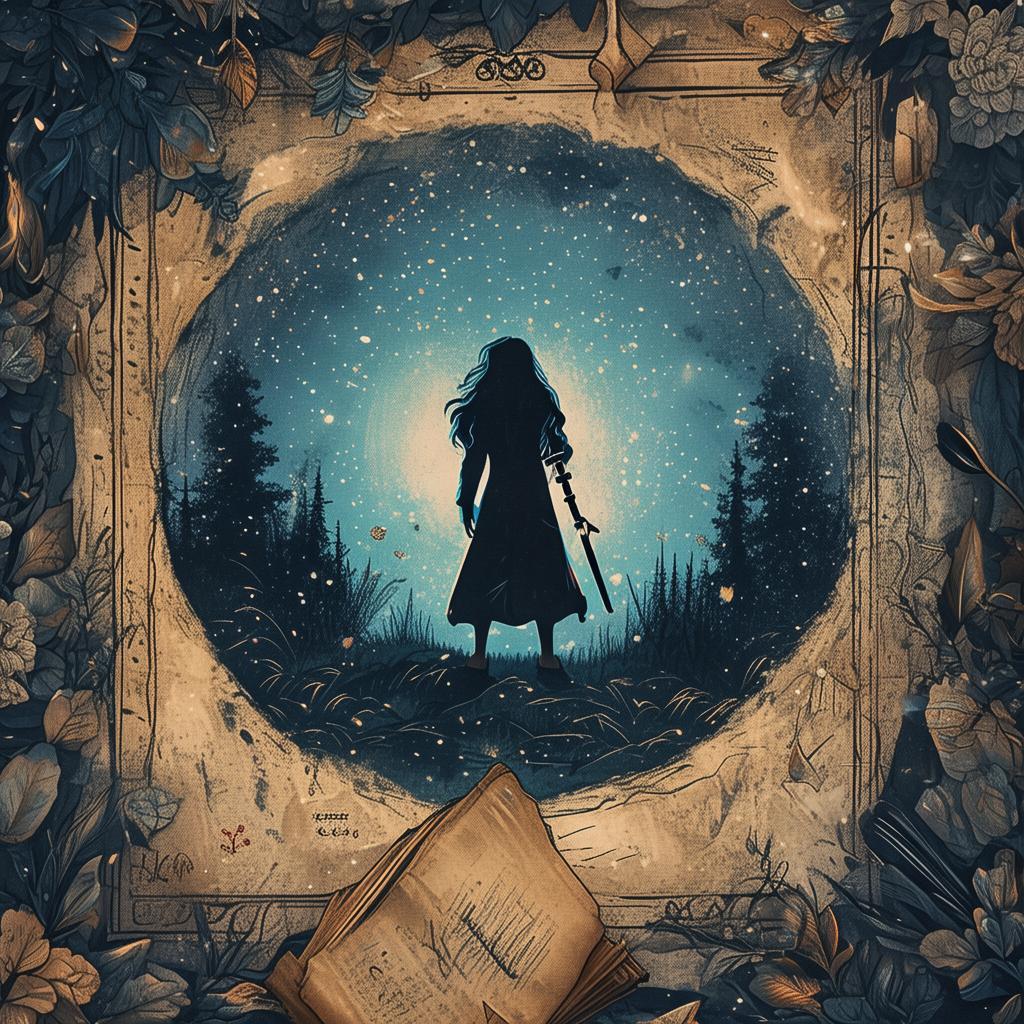Whispers of the Sitar: The Symphony of Samsara
In the shadowed corners of the ancient temple, the scent of incense mingled with the distant hum of a sitar. Young Liang, a cultivator of modest means, had always been fascinated by the ethereal notes that seemed to dance through the air, untouched by the world below. His path had been a quiet one, dedicated to the cultivation of the mind and the body, but today, he felt a peculiar unease that could not be explained.

As the sun began its descent, casting long shadows across the temple floor, Liang found himself drawn to a forgotten corner where an old, dusty scroll lay nestled in a heap of ancient texts. The scroll, covered in a patina of age, seemed to call out to him with a voice of its own. He carefully unrolled it, revealing intricate patterns and strange symbols that danced in a rhythm all their own.
The symbols were unlike anything Liang had ever seen. They depicted not just sounds, but a journey through the vast tapestry of Samsara, the eternal cycle of birth, death, and rebirth. In the center of the scroll was a single word, written in a language he did not recognize: "Sitar."
Curiosity piqued, Liang began to trace the symbols with his fingers, each stroke of his fingers resonating with a deep, resonant tone that filled the temple. As he did, a vision began to unfold before him—a musical journey that was as much a part of his soul as his own heartbeat.
He saw the birth of a sitar, its strings being tuned by the hands of a master who had long since passed from this world. He heard the first notes being strummed, a sound that was both beautiful and haunting, a melody that seemed to weave itself into the very fabric of the universe.
The journey took Liang through the lives of countless souls, each one playing their part in the symphony of Samsara. He witnessed love and loss, joy and sorrow, and the relentless pursuit of enlightenment. In each life, the sitar played a role, guiding the soul through the trials and tribulations of their existence.
Liang realized that the sitar was more than just an instrument; it was a guide, a mentor, and a teacher. It had been through countless lifetimes, witnessing the rise and fall of empires, the birth and death of countless souls. It was the embodiment of the eternal journey of self-discovery and enlightenment.
As Liang continued to delve deeper into the scroll, he began to feel a strange connection to the sitar. It was as if the instrument had chosen him, recognizing in him the potential to become a vessel for its ancient wisdom. He felt a surge of energy flow through him, an energy that was as much a part of him as his own life force.
With each stroke of his fingers across the strings, Liang felt himself being drawn into the world of the sitar. The instrument began to sing, a song of enlightenment that filled him with a sense of peace and clarity. He understood then that the sitar was not just a musical instrument; it was a path to transcendence, a way to break free from the cycle of Samsara.
As the journey continued, Liang faced challenges that tested his resolve and his understanding. He had to confront the dark parts of his own soul, the fears and doubts that had held him back for so long. Through the sitar's guidance, he learned to embrace his inner darkness, to understand it, and to transform it into light.
The final stage of the journey was a revelation. Liang realized that the sitar was not just a guide through the lives of others; it was a guide to his own life. The instrument had shown him the path to enlightenment, but it was up to him to walk it.
With the sitar as his companion, Liang embarked on a new journey. It was a journey that would take him beyond the bounds of life and death, a journey that would change him forever. He played the sitar, not just with his fingers, but with his entire being, his soul resonating with the timeless melody.
In the end, Liang discovered that the sitar was not just a musical instrument; it was a key to unlocking the mysteries of the universe. Through the symphony of Samsara, he found a path to enlightenment that would transcend time and space. And as the last note of the sitar's melody filled the temple, Liang knew that he had found his true calling, a calling that would guide him through all eternity.
✨ Original Statement ✨
All articles published on this website (including but not limited to text, images, videos, and other content) are original or authorized for reposting and are protected by relevant laws. Without the explicit written permission of this website, no individual or organization may copy, modify, repost, or use the content for commercial purposes.
If you need to quote or cooperate, please contact this site for authorization. We reserve the right to pursue legal responsibility for any unauthorized use.
Hereby declared.









